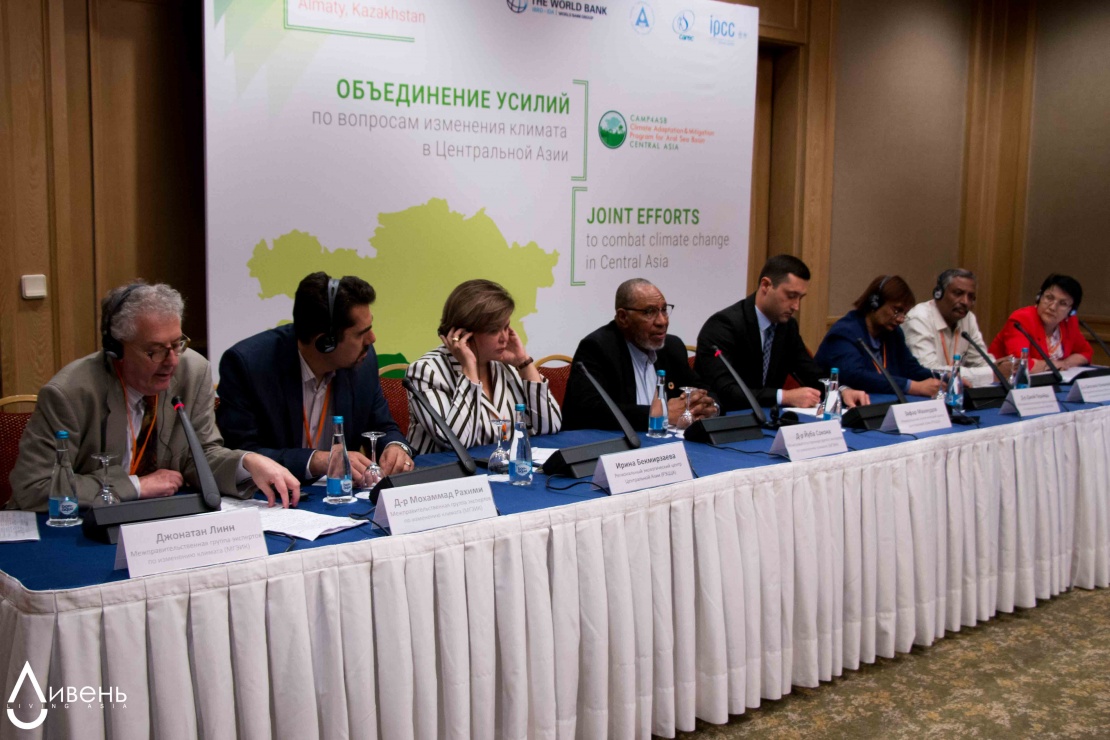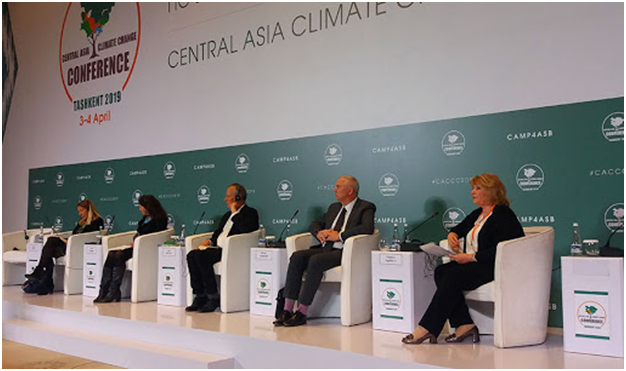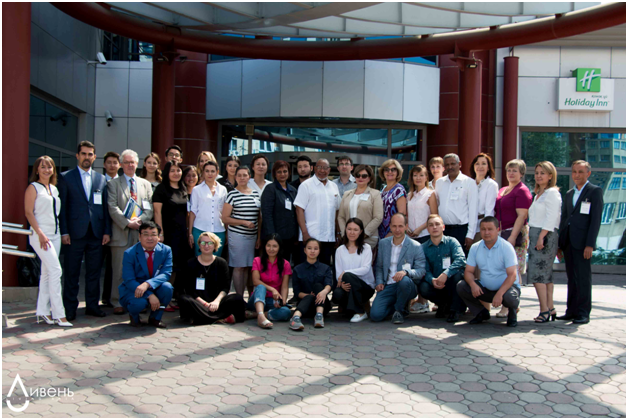
Central Asia is one of the most vulnerable to climate change regions. The main reasons are sharply continental climate, mountainous landscapes, water scarcity, and agricultural orientation of national economies. Among the main climatic threats that pose a particular danger to the region: an increase in the number of extreme weather events, a decrease in water supply, land degradation, and an increase in the load on pastures. In addition, by the end of the century an increase in average temperature in the region of 6 ° C is predicted.
Given the vulnerability of the region, in 2016, the Climate Change Adaptation and Mitigation Program for the Aral Sea Basin (CAMP4ASB) was initiated. Which results have been achieved throughout the last year?
One of the main challenges was to create a common and comprehensive knowledge platform on climate change issues. Therefore, the development of the Central Asian Climate Information Platform (CACIP) was initiated, which will help stakeholders to have access, analyze and visualize publicly available data to support their awareness-raising activities, as well as assessment and decision-making procedures. The latest CACIP newsletters are available here.
The platform will fulfill the role of a kind of “one-stop shop” of climate knowledge both at national and regional levels. Information will be available free of charge for everyone. User registration is required only to download knowledge products / information products and gain access to the forum.

The Second Central Asian Climate Change Conference (CACCC) was held on April 3-4, 2019 in Tashkent, the Republic of Uzbekistan. The main focus of the event was to strengthen cooperation in the region and expand the exchange of knowledge and information. The main topics of discussion were:
● Global climate policy and national commitments;
● The impact of climate change and adaptation in a global and regional context;
● Climate services;
● Technologies and practices in the field of climate change;
● Climate financing;
● Academic and educational potential;
● The role of youth in the enhancement of climate action.
The conference was attended by about 400 people, which was almost 2 times the number of participants of the first CACCC in 2018. Three pre-conference, five plenary thematic sessions, five side events, a training for journalists, a specialized exhibition of best practices and technologies for adaptation were organized within the framework of the conference. It is worth mentioning that in the framework of an informal meeting of representatives of the Foreign Ministry and parliamentarians of Central Asian countries, it was decided to hold a dialogue platform meeting with the participation of experts from the Intergovernmental Panel on Climate Change (IPCC).
Arrival of the IPCC

On August 21-22, 2019, a delegation of the Intergovernmental Panel on Climate Change (IPCC) visited Almaty. The main objective was to raise the awareness of stakeholders about the results of the Special Report 1.5 degrees Celsius (SR1.5) and the Fifth Assessment Report (AR5) with a focus on Central Asia. It should be noted that this was the IPCC’s first visit to the Central Asian region, and one of the main tasks was to provide information on the progress of the IPCC in anticipation of the 6th Assessment Report.
The events were attended by over 150 people, and the Regional Environmental Center of Central Asia was invited to obtain accreditation as an observer. To learn more please click here.
Regarding the achievements in forecasting, the results of using the short-term SWIM forecasting model showed an accuracy of more than 80% with respect to the spring floods of 2019. To date, the model is used on 7 rivers, as well as in the process of adaptation for an additional 5 rivers.
On May 28, 2019, an international “round table” was held in Almaty, the main purpose of which was to identify key needs and increase the effectiveness of hydrometeorological services in the region.
Among the achievements in the field of forecasting snowcovers, the MODSNOW-Tool model showed an average forecast accuracy of 75% for forecasts for the growing season, 69.13% for monthly forecasts and 70% for a combined forecasts. In order to increase the potential of hydrometeorological services, three national trainings were organized for the NHSS of Kazakhstan (19 people), Tajikistan (11 people), and Uzbekistan (15 people) on using the MODSNOW tool.
During 2019, training courses on modeling approaches were tested in 6 universities in Central Asia. A total of 111 students attended the course (Kazakhstan-36, Kyrgyzstan-16, Tajikistan-17, Uzbekistan-34).
In addition, in the spring of 2020, a student research contest on climate change in Central Asia was launched. The main objective of the competition is to involve the young generation in solving issues related to climate change in Central Asia. Applications will be accepted until May 31, 2020.
In 2019, 80 applications were received as part of the competition, 15 of which were selected. The chosen applicants received support in the amount of 1,500 US dollars for research activities. In addition, the winners also took part in the summer school for the academic writing of research papers, and also presented the results of their work at the CACCC 2019 exhibition.
Climate network of public organizations in Central Asia

In order to consolidate resources in the region in 2019, a Memorandum on the creation of the Central Asian Climate Network of public organizations was signed. The network includes national network organizations working on environmental issues, sustainable development and climate change, among them: Ecoforum of NGOs of Kazakhstan, Climate Network of Kyrgyzstan, Climate Network TajCN of Tajikistan, Society for the Protection of Nature of Turkmenistan and Ecological Movement of Uzbekistan.
The main goal of this network is to unite the efforts of national public organizations and civil society networks to ensure a more effective and coordinated implementation of climate change policies in Central Asia.
As part of the network, a number of events were carried out:
• On September 12-17, 2019, the Ecological Movement of Uzbekistan held a series of seminars and round tables in all regions of the country on the International Day for the Protection of the Ozone Layer in Uzbekistan.
• On December 19, 2019, the Climate Network of NGOs in Tajikistan held a round table entitled “Adaptation to climate change at the local level”.
• On December 16, 2019, the National Climate Forum was held in Bishkek to stimulate the mainstreaming of climate issues on the national agenda.
Among the special achievements, it should also be noted that the project focused on increasing the involvement of women. 36% of the audience of all project activities at the local, national and regional levels were women. In addition, in 2019, the number of female beneficiaries increased by 12% and amounted to 53.5%.
For 2019 in Uzbekistan, 5 subprojects received funding in the total amount of 1,113,988.60 dollars. USA The number of direct beneficiaries for the reporting period was 63, including 41.26% of women. The area covered by project support for the land amounted to 3.6 hectares. 80% of subloans were directed to the construction of modern greenhouses, 20% - to purchase equipment for the production of feed.
In Tajikistan, in 2019, 868 subloans were issued in the total amount of $ 2,106,120.42. USA. The total number of those who received funding during the reporting period amounted to 15,657 people, including 66% (10,364) of women. As a result, 11 2018 additional jobs were created. The total area of targeted agricultural land amounted to 3,814 hectares.
Climate monitoring
The Center of Hydrometeorological Service of Uzbekistan delivered 50 automatic weather stations (AMS), which will be installed at stations and posts in the regions of the country. With their help, the meteorological situation in Uzbekistan will be monitored. In addition to that the State Committee of the Republic of Uzbekistan on ecology and environmental protection will be provided with movable laboratories. The main idea is that, thanks to new equipment, the accuracy of weather forecasts will be increased, which in turn will increase the timeliness and accuracy of warnings about dangerous hydrometeorological phenomen___________
Climate Change Adaptation and Mitigation Program for the Aral Sea Basin
![]()